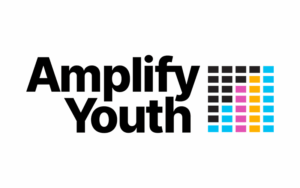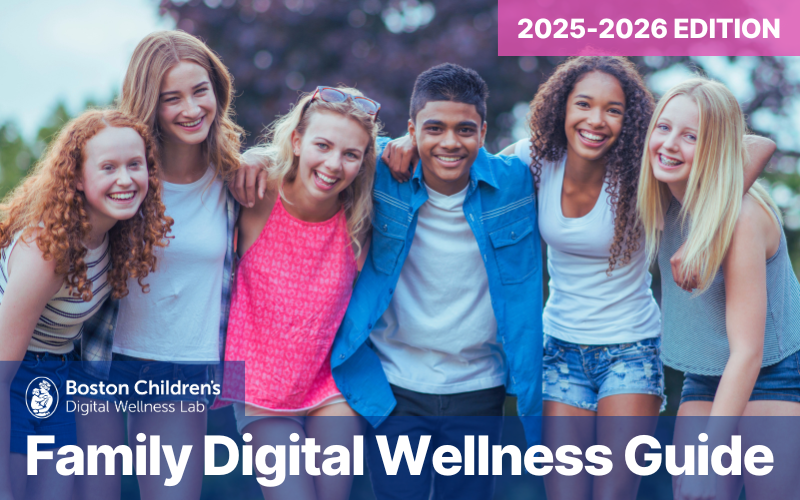Pritika K. is a member of the Digital Wellness Lab’s 2023-24 Student Advisory Council. She shares what she would like to see changed to make tech healthier for teens, and more.
What does a “day in the life” look like for you with using technology and digital media? (both at home and at school)
Interactive media, screens and digital technologies have truly globalized our world and closed the space within us all. With my current experiences as Youth Ambassador of different organizations like the Art of Living and Step Up, I reach out to and meet with so many business executives and researchers and then stay in touch through social media platforms. Additionally, social media allows me to spread messages of positive social impact. For example, I am using social media to launch my podcast (which is on the intersection of mentoring and mental health), and plan to use social media again as I launch my teen mental health book. But media is beyond just social media, it is also the internet, communication platforms like Gmail, online messaging and video conferences. In my advocacy work, this has been very helpful: For instance, I interact with Professor Ellen Langer, first woman to be tenured in psychology at Harvard, through online communication platforms like Gmail, and have been able to get an interview for my book and a podcast session recording with the Professor. Furthermore, as Art of Living’s Youth Ambassador, I interviewed an esteemed panel of guests for a session on the UN International Day of Happiness. Through Youtube and social media, the Art of Living organization and I spread awareness of this day and its benefits. Overall, interactive media and screens allow me to leverage my connections and continue being a voice — loud and proud — for the next generation.
What are your favorite platforms/apps and why?
My favorite app/social media platform would definitely be LinkedIn! I feel like LinkedIn has maintained a very professional / business environment. I love checking LinkedIn for more opportunities that I can pursue for my mentoring and mental health advocacy. As mentioned earlier, I also try to grow my podcast through LinkedIn.
What are the greatest opportunities you see for teens when it comes to using technology?
Connections. These are what make us human. I feel like the greatest benefit of technology to youth is that it enables us as teens to open our eyes to many perspectives and diverse opinions by connecting with many individuals. Technology connects everyone across the globe, giving teens the opportunity to be active members of not just the “digital world” but also society as a whole.
Teens can now advocate for change and in turn be change makers because the digital world gives them a platform with endless opportunities to use their voices to fuel change. I feel that opening teen eyes to diverse perspectives through technology not only allows for more connections but also greater awareness of how critical diversity and inclusion are in the world. Technology has led to an increase in support for the “diversity movement” and the younger generations/teens are the ones spearheading these advocacy initiatives because they have been exposed to diverse groups of people and as a result teens see how important diversity is. Overall, technology has been a positive force for teens when it comes to connecting them with more people and opening their young minds to diverse perspectives.
Teens can now advocate for change and in turn be change makers because the digital world gives them a platform with endless opportunities to use their voices to fuel change. I feel that opening teen eyes to diverse perspectives through technology not only allows for more connections but also greater awareness of how critical diversity and inclusion are in the world.
What are the greatest challenges you see for teens when it comes to using technology?
Just like every opportunity can have a cost, social media can be a costly affair too. Today’s youth face countless challenges from the infinite loop of social media feeds and negative influences. In addition to school work and projects, they tend to put their “best face forward” on social media and as a result create pressure on themselves. Through this approach, social media is becoming like an artificial universe of its own with increased privacy risks. Side effects are physiological arousal, mental health issues and stress, especially for adolescents. With social media and mental health it is important to equip youth with awareness, discipline, the right tools and resources. I do believe as a youth I must engage with social media to get benefits, while staying in the real world and not getting trapped in social media. For me social media is a powerful tool, but it is a double edged sword, therefore balance is key.
With social media and mental health it is important to equip youth with awareness, discipline, the right tools and resources.
What are the greatest opportunities you have and challenges you personally face when it comes to managing your technology use?
When it comes to the greatest opportunities I have when it comes to managing my technology use I feel it would be “walking in with purpose”. This means I use the web with an end goal in mind, whether it be how long I scroll through a Linkedin feed or whether it be knowing what it is I am looking for online. I feel like it is very easy to fall into the trap of aimlessly scrolling for hours and hours on social media, but if you “time box” and set a fixed time for yourself, you oftentimes don’t end up wasting hours and hours online. I feel that the biggest challenge we all face as youth when managing our technology use would be not being actively aware of the fact that the information that we are getting online may be skewed or misrepresented. There are great dangers of only knowing “one side of the story” especially since social media algorithms often cater to teens’ beliefs. Therefore, when it comes to managing technology use, it is so, so important for youth to not spend hours and hours learning only one viewpoint/perspective, while ignoring the other side. The best way to overcome this challenge is by encouraging youth to not spend all their time on technology learning “one side of the story”, but rather invest their time opening their minds to new perspective
I feel like it is very easy to fall into the trap of aimlessly scrolling for hours and hours on social media, but if you “time box” and set a fixed time for yourself, you oftentimes don’t end up wasting hours and hours online.
What would you want to see changed or redesigned for technology and/or media to be healthier for teens?
Mindsets are crucial in our lives. They define who we are and shape our interactions with those around us. In our global, interconnected world, it is imperative for individuals, especially adolescents to have an open mind. However, with the increased use of Artificial Intelligence (AI) in social media, it has become difficult for youth to develop a well-aware and unbiased view of the world. Social media algorithms are often programmed to bombard users with a large number of feeds based on their slight inclination towards a specific topic or viewpoint. As a result, their minor preferences escalate and evolve into a more rigid mentality. For example, if somebody were to start off with a slight proclivity towards anti-abortion rights and search up content related to that topic just once or twice, then AI driven social media would start delivering content cementing a more one-sided and polarized view of that person on anti-abortion rights. Therefore, if I could change anything about the digital landscape it would be reducing the tendency of social media feeds to deliver skewed information. This will give people the big picture rather than elevating their biased narratives. Youth are at a fragile age where their interactions with the digital world shape them and their future mindset, so it is important to shape youth minds the right way. Through the digital landscape, it is critical to foster awareness, acceptance and understanding of diverse perspectives in youth.
If I could change anything about the digital landscape it would be reducing the tendency of social media feeds to deliver skewed information. This will give people the big picture rather than elevating their biased narratives.
What, if anything, do you think parents and caregivers are missing when it comes to understanding how teens use media?
I feel like parents and caregivers sometimes interpret the media to be either a very good thing or a very bad thing. This polarized view oftentimes creates this disconnect between young people and those older than them. I feel like it is imperative for parents and caregivers to be aware that media/technology is a double edged sword: With unbalanced use of technology, it can result in distractions and stressors, but with balanced use, technology can leverage the potential of youth and fuel positive change in society.
What guidance or advice do you have for parents and other caregivers to help teens to build and maintain healthy behaviors around digital media and technology?
My biggest advice for parents and other caregivers to help teens build and maintain healthy behaviors around digital media and technology would be to educate teens on balanced use of technology — making sure to encourage teens to use technology but with mindfulness and awareness of how much time and energy is being used on technology. Polarization is not the solution: Isolating teens from technology will keep them oblivious to a myriad of opportunities, but letting teens use technology without limits or checks can result in great psychological stress. In simple words the solution is to educate the younger generation with an unbiased, neutral view of technology!
My biggest advice for parents and other caregivers to help teens build and maintain healthy behaviors around digital media and technology would be to educate teens on balanced use of technology — making sure to encourage teens to use technology but with mindfulness and awareness of how much time and energy is being used on technology.
Pritika K. is a member of the Digital Wellness Lab’s 2023-24 Student Advisory Council. She is a high school junior from Plano, Texas.
Here at the Lab, we welcome different viewpoints and perspectives. However, the opinions and ideas expressed here do not necessarily represent the views, research, or recommendations of the Digital Wellness Lab, Boston Children’s Hospital, or affiliates.








